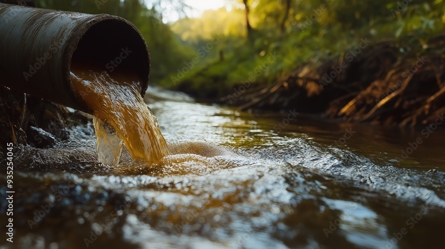Living in Fremont, Nebraska, where the Platte River's seasonal flooding and severe weather patterns can impact our homes, understanding category 3 water damage is crucial for every homeowner. Also known as black water damage, this severe form of water damage requires immediate professional attention due to its significant health risks and potential for property destruction.
What Makes Water Damage Category 3?
Category 3 water damage involves highly contaminated water containing harmful bacteria, fungi, and other dangerous microorganisms. In Fremont, where our proximity to both the Platte River and agricultural areas creates unique exposure risks, this type of water damage often occurs during spring flooding or severe storm events. The contaminated water may contain soil, sewage, chemicals from farmland runoff, or other hazardous materials that can pose serious health risks to your family. Unlike clean water from a burst pipe or even gray water from appliances, category 3 water is considered grossly unsanitary. This classification comes from the water's origin and the potentially dangerous substances it carries. In our agricultural community, these contaminants can include pesticides and fertilizers from surrounding farmland, making proper identification and handling even more critical.
Common Sources of Category 3 Water Damage
In Fremont, several location-specific factors contribute to category 3 water damage. Understanding these sources is crucial for local homeowners, as our unique position near the Platte River and agricultural areas creates distinct risks. Here are the primary sources of category 3 water damage in our region:
River Flooding - Water from the Platte River's seasonal flooding carries agricultural runoff, sewage, and other contaminants. During spring snow melt and heavy rain periods, this contaminated water can infiltrate homes in low-lying areas of Fremont, particularly in neighborhoods east of Military Avenue.
Sewage System Backups - Our city's combination of aging infrastructure and clay-rich soil creates perfect conditions for sewer line failures. When heavy rains overwhelm the system or pipes crack due to soil movement, raw sewage can back up into homes through basement drains and lower-level fixtures.
Storm Damage and Roof Leaks - During Nebraska's intense thunderstorm season, water entering through damaged roofs becomes contaminated as it mixes with attic insulation, stored chemicals, and deteriorating building materials. This is especially common in older homes near downtown Fremont with aging roof structures.
Agricultural Runoff - Our location amid farmland means floodwater often contains concentrated fertilizers, pesticides, and livestock waste. During heavy rains, this contaminated water can seep into foundations and basements, particularly in homes on the outskirts of Fremont near agricultural areas.
Rising Groundwater - When saturated with flood water or sewage, our region's high-water table can force contaminated water up through foundation cracks and basement floors. This is particularly problematic in spring months when groundwater levels are naturally higher.
These sources of category 3 water damage require different approaches to prevention and mitigation. Understanding which risks are most relevant to your home's location in Fremont can help you better prepare for and respond to potential water damage situations.
What Health Risks Come with Category 3 Water Damage?
The health implications of category 3 water damage are severe and require immediate attention. Exposure to this type of contaminated water can cause serious illnesses, particularly in vulnerable populations like children, elderly residents, and those with compromised immune systems. Contact with or exposure to category 3 water can lead to various health issues, including bacterial infections, viral diseases, and severe gastrointestinal problems. In our agricultural community, where water may contain concentrated fertilizers and pesticides, the risks can be even more significant, potentially causing both immediate and long-term health effects.
Why Professional Restoration Is Essential for Category 3 Water Damage
When dealing with category 3 water damage, professional restoration isn't just recommended – it's necessary. The cleanup process requires specialized equipment, protective gear, and extensive knowledge of proper decontamination procedures. In Fremont's climate, where humidity levels can promote rapid mold growth, quick and thorough professional response becomes even more critical. Professional restoration teams use advanced techniques and equipment to safely remove contaminated water, sanitize affected areas, and restore your home to a safe condition. They understand local building codes and insurance requirements, ensuring that the restoration process meets all necessary standards while protecting your family's health.
The Professional Restoration Process
Professional restoration begins with a thorough assessment of the damage extent, particularly important in Fremont homes where water may have seeped into basements or crawl spaces common in our area's architecture. Technicians will document all damage for insurance purposes and create a comprehensive restoration plan. The next step involves water extraction using industrial-grade equipment, followed by complete decontamination of all affected areas. This process is particularly crucial in our climate, where the combination of summer heat and humidity can accelerate bacterial growth and decay if not properly addressed.
How to Prevent Category 3 Water Damage in Nebraska Homes
Prevention strategies for category 3 water damage should be tailored to our local environmental challenges. Regular maintenance of your home's sewer system, including installing backflow preventers, can help protect against sewage backups during heavy rain events common in eastern Nebraska. For homes in flood-prone areas near the Platte River, consider installing flood barriers and maintaining proper drainage systems around your property. Regular inspection of your roof and foundation, particularly after severe weather events, can help identify potential vulnerabilities before they lead to serious problems.
Contact ServiceMaster of Fremont for Professional Restoration
When facing category 3 water damage in your Fremont home, quick action is essential to protect your family's health and your property's value. ServiceMaster of Fremont specializes in handling severe water damage situations, understanding the unique challenges posed by our local climate and environmental conditions. Our experienced team is available 24/7 to respond to emergencies, equipped with the knowledge, tools, and expertise to safely restore your home. Don't risk your family's health by attempting to handle category 3 water damage yourself – contact us immediately for professional assistance and peace of mind.


